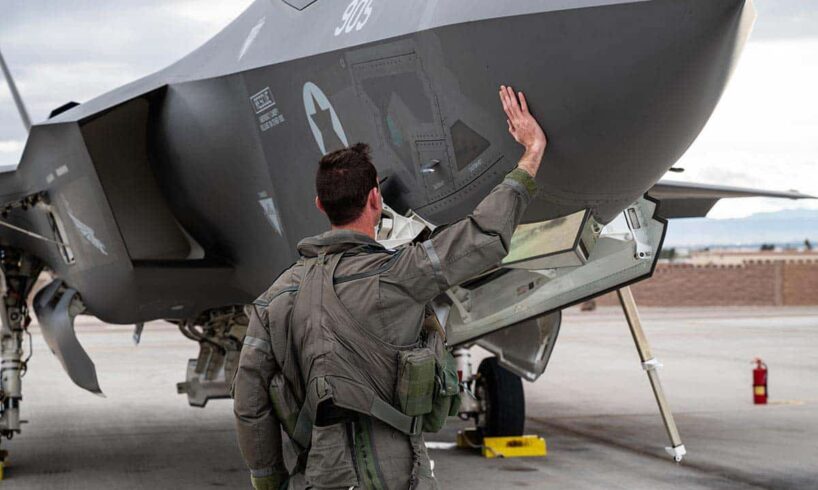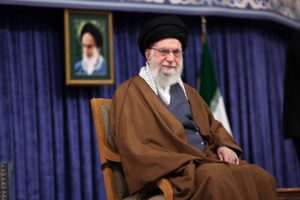
Israel’s military edge in the Middle East may be at risk, as U.S. President Donald Trump committed to sell Saudi Arabia advanced F-35 fighter jets during a meeting with Saudi Crown Prince Mohammed bin Salman this week.
What is the F-35?
The F-35 is the U.S. military’s most advanced fighter jet. It’s great at stealth missions and can carry large missiles far distances. On top of all that, it has a whole array of advanced sensors that give pilots a detailed view of the battlefield.
Israel has special agreements with the U.S. that allow it to make adjustments and additions to the aircraft after they are received. That means Israeli aircraft have their own suite of equipment, including advanced, Israeli-made electronic warfare equipment and additions allowing Israeli jets to fly farther and link in with Israeli intelligence networks.
During the war with Iran, these jets played a crucial role, as they could fly the far distance from Israel to Iran and carry the missiles needed to take out Iranian nuclear and missile facilities.
The U.S. commitment to Israel’s Qualitative Military Edge
For years, the U.S. has committed to preserving Israel’s Qualitative Military Edge (QME) in the Middle East. In 2008, this commitment was enshrined in law, prohibiting arms sales that would harm Israel’s military edge.
However, the definition of what qualifies as a qualitative military edge isn’t so clear. U.S. policy has a long description that basically boils down to: Israel needs to have enough weapons, tech, ammo, and talent to confront any credible threat in the region. That line isn’t very concrete, though.
What if Israel and another country get the same weapons, but Israel is known for training its soldiers better? What if they get the same weapon, but a few features are removed from the version sent to other countries? There’s a lot of wiggle room when determining if the U.S. is holding up its side of the deal.
How will the Saudi deal affect Israel’s military edge?
At first, Trump said that the Saudis would likely receive the same type of F-35s that Israel got. However, U.S. officials later clarified to Reuters that the F-35s for Saudi Arabia would be less advanced.
Saudi Arabia also won’t be getting all the extras Israel adds to its F-35s, and, at least at the moment, won’t have permission to modify the aircraft like Israel can.
WASHINGTON, DC November 18: US President Donald Trump and Crown Prince and Prime Minister Mohammed bin Salman of Saudi Arabia during a bilateral meeting in the Oval Office of the White House on Tuesday November 18, 2025. (Photo by Demetrius Freeman/The Washington Post via Getty Images)
Additionally, Saudi Arabia would only receive two squadrons of jets while Israel already has two and has a third on the way. The Saudis also wouldn’t get some of the advanced missiles Israel is set to receive.
In addition, the sale of the F-35s will require Congressional approval before being finalized, meaning it will take several years before the Saudis get their jets. This will increase the gap in experience that Israel has already built up with the F-35s.
There are some serious downsides and risks for Israel, though, in light of the agreements signed between the U.S. and Saudi Arabia.
Israel was hoping for any such deal to be conditioned on the Saudis finally joining the Abraham Accords and normalizing relations with Israel. The decision to move forward regardless removes a significant bargaining chip that could have been used to pressure the Saudis to drop some of their demands surrounding normalization.
However, Saudi Arabia has made clear for years already that it’ll only move forward with normalization once there’s a clear path agreed on for the creation of a Palestinian state. Additionally, the U.S. has its own interests that don’t always align with Israel’s, especially when it comes to its increased interest in building further ties with the Gulf states. This latest deal offers numerous benefits to the U.S., benefits that it believes are more pressing than normalization.
The deal also sets a precedent that has worried some experts. If Saudi Arabia is getting F-35s, could other countries in the region be next? What about Qatar, which recently signed a mutual defense agreement with the U.S., an agreement even Israel hasn’t received?
Some analysts are also concerned that Saudi Arabia’s ties with China could allow China to gain access to and learn from the F-35s.
The F-35 sale wasn’t the only deal bin Salman signed with Trump during his visit to Washington.
The two also agreed to move forward with a civil nuclear energy deal that would provide nuclear technology to Saudi Arabia for power generation. American companies would build a nuclear power plant in the country under the agreement. U.S. Energy Secretary Chris Wright insisted that the deal would not allow Saudi Arabia to enrich uranium itself, as uranium enrichment can be aimed toward both civilian and military uses. Congress will need to finalize this deal as well.
Trump also agreed to sell Saudi Arabia nearly 300 American tanks as part of a defense sale package during bin Salman’s visit, alongside a series of trade agreements.
Prime Minister Benjamin Netanyahu‘s office responded to concerns about the F-35 sale, saying, “The Prime Minister and the President of the United States and Israel have a longstanding understanding, which is that Israel maintains the qualitative edge when it comes to its defense. That was true yesterday, that has been true today, and the Prime Minister believes that will be true tomorrow and in the future, of course.”
In an interview with the Abu Ali Express Telegram channel, Netanyahu said he spoke with U.S. Secretary of State Marco Rubio on Wednesday, who affirmed that the U.S. would continue to preserve Israel’s qualitative military edge.
Netanyahu stressed that the U.S. is obligated to preserve Israel’s military edge by law, and that Rubio specified that the U.S. would continue that policy, including with the F-35s. Netanyahu added, however, that he “didn’t want to get into further details” about the conversation with Rubio or the F-35 sale.
The prime minister said that based on the report he received about the meeting between Trump and bin Salman, Saudi Arabia didn’t get everything it wanted.
Eyal Hulata, former head of Israel’s National Security Council, noted that the Saudi purchase of F-35s is only one part of a growing threat as countries around the region expand their militaries.
“The force buildup in countries like Egypt and Turkey is tremendous, and while we have peace with both at the moment, there is also growing tension, and Israel must prepare for contingencies,” Hulata told The Wall Street Journal.
Israeli journalist Anna Barsky argued that the deals made by Trump and bin Salman showed that Israel’s status in the region was changing. She noted that Trump was moving forward with the deal despite Israeli concerns and a lack of normalization.
“Bin Salman, who understands well the weight of his kingdom in the Arab-Muslim world, is not content with a guest role. He wants to shape the rules of the game. To lead the Sunni world, he needs to show that he is not only making huge projects and cities of the future – but also caring about the ‘decent solution for the Palestinian people,’” Barsky said.
“The path that is now becoming clear is quite simple, even if it is unpleasant to Israeli ears: Saudi Arabia wants normalization; Trump wants a historic achievement; both sides know very well what the required price is; only in Israel are they still trying to convince themselves that it is possible to get the main course without paying the bill.”
“In the end, last night’s meeting didn’t make the sky fall, but it drew lines on the map: There is no more ‘peace for peace.’ There is a new regional order in exchange for a real political and diplomatic price. Whoever doesn’t pay will be left out of the room. Whoever doesn’t understand will be left out of the game.”





